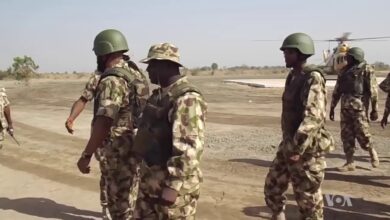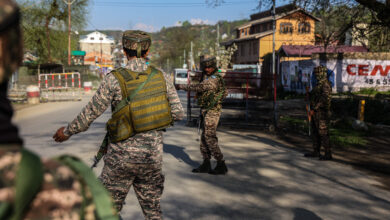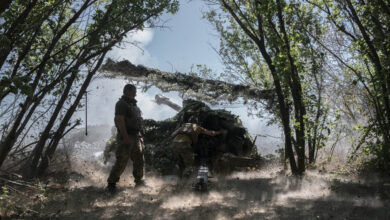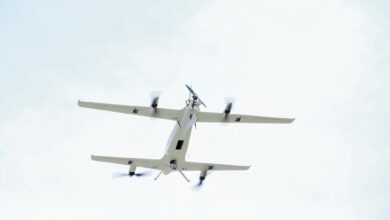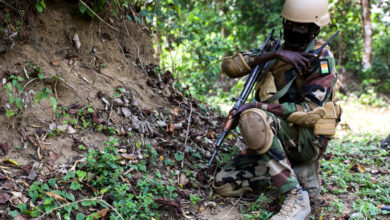At least seven Nigerian soldiers were killed in a Boko Haram jihadist attack on a military base near the Niger border, the army said.
Troops from the 157 Battalion were engaging Boko Haram militants in a fierce battle on Monday in Metele, a village in Nigeria’s northeastern Borno State, the military tweeted, adding that reinforcements were being mobilized in Kangarwa and Arege.
Seven soldiers died and 16 were wounded “in action” the army said on Wednesday, October 10, but military and civilian militia sources put the death toll higher.
The Nigerian army often downplays casualties.
“We lost 18 men in the fight which lasted for seven hours,” a military officer told AFP, speaking from the Borno state capital of Maiduguri.
“Our men fought hard and dealt heavy blows on the terrorists but they were overwhelmed by the enemy who overran the base,” said the officer who asked to remain anonymous because he was not authorized to speak on the incident.
A civilian militia assisting the military in fighting the jihadists said that on Tuesday 18 bodies of soldiers were brought to the garrison town of Monguno, 120 kilometres (70 miles) from the attacked base.
“The fighting was fierce. It started around 4:30 p.m. and continued till 11:30 p.m.,” the militia man said.
Boko Haram suffered “heavy” casualties but managed to invade the base and take weapons, he said, adding that the jihadists destroyed “those they could not take away.”
“The sustained superior firepower of the troops led to the neutralization of 76 BHTs [Boko Haram terrorists],” the army tweeted.
Troops ‘infiltrate’ Kaltunbare Boko Haram camp
Also on October 10, troops from 22 Brigade supported by “vigilantes” infiltrated a Boko Haram camp in Kaltunbare in Borno state, the army tweeted.
The army said three Boko Haram members were “neutralized” and others “escaped with gunshot wounds”
Two “minors” were rescued, the army said.
Boko Haram is divided into two factions that have competing goals and operational methods. One, led by Abubakar Shekau, is notorious for suicide bombings and indiscriminate killings of civilians. The other, known as Islamic State West Africa Province and led by Abu Mus’ab Al-Barnawi, largely focuses on attacking military and government targets.
ISWAP is dominant around the shores of Lake Chad, while the Shekau-led faction is concentrated in rural areas of Borno state.
Islamic State faction increases attacks in Borno state
ISWAP has in recent months been blamed for increasing attacks on military bases in Borno and nearby Yobe.
On September 25, Nigerian troops repelled a Boko Haram attempt to infiltrate their location in Gashigar in Borno state.
Two days earlier, troops repelled another attempt by Boko Haram to overrun a military base in the village of Kekeno, near the garrison town of Monguno in Borno. A fighter jet was deployed that forced the jihadists to withdraw after an hours-long assault.
On September 12, Nigerian soldiers repelled an attempted Boko Haram attack on a base in Damasak, in the far north of Borno state on the border with Niger.
On August 30, 48 soldiers were killed in an attack on a military base in Zari, around 30 km (20 miles) from Damasak on the Niger border. That attack is thought to have been launched from nearby Garunda village, where 17 soldiers were killed in a Boko Haram attack on a military base on August 8.
More radical elements are said to have recently taken over the ISWAP leadership, killing the group’s de fatco leader, as well as another commander who allegedly planned to surrender along with 300 hostages. ISWAP has previously vowed to hit only military and government “hard” targets.
Boko Haram has lately intensified its armed campaign, launching a number of major assaults on military bases in Nigeria’s remote northeast region, although military commanders have strongly denied reports of heavy troop casualties.
Scores of soldiers have been killed, injured or missing in the latest wave of attacks but the military has repeatedly denied or played down losses to the jihadists.
The recent surge undermines repeated claims by the military that the insurgent group has been defeated, and Nigeria’s President Muhammadu Buhari’s insistence that Boko Haram are a spent force as he gears up for elections next year.
The jihadist insurgency is in its ninth year and has left more than 27,000 people dead and displaced 2.6 million. Although Boko Haram no longer controls the swathes of territory in northeast Nigeria it did at its 2014 height, its militants still pose a threat to the region.
With reporting from AFP







